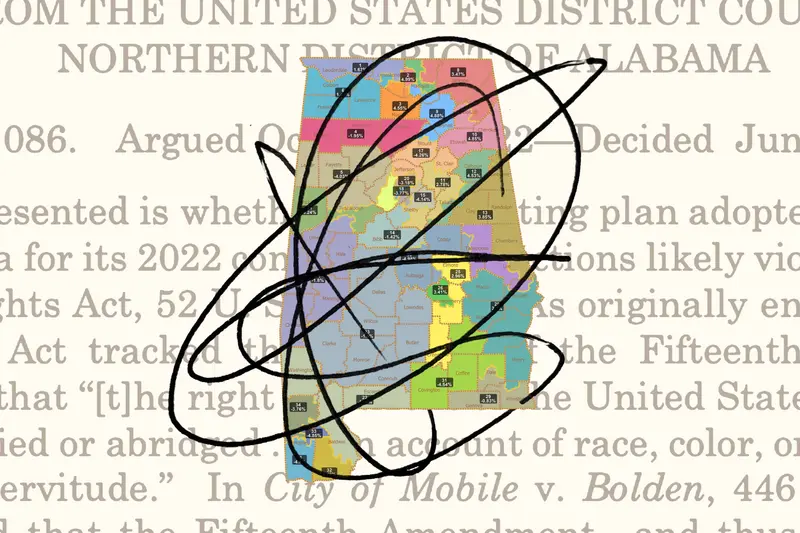Election maps across the Deep South are likely to be redrawn because of a surprise Supreme Court ruling that upheld a key provision of the Voting Rights Act, changes that could alter the balance of power that has given Republicans a razor-thin majority in Congress.
The court’s 5-4 decision in Allen v. Milligan, written for the majority by Chief Justice John Roberts, affirmed the section of the act that prohibits maps drawn to dilute minority voting strength. It was an unexpected victory for a law passed in 1965, which has been gradually dismantled under the Roberts court.
The Supreme Court is now expected to rule quickly on a similar challenge to election maps pending in Louisiana, which could create another congressional district favorable to Democrats in addition to the one in Alabama.
And a racial gerrymandering case from South Carolina is moving toward oral arguments in October. Republican state leaders appealed a decision from a three-judge federal panel that found illegal targeting of Black voters in a map that gave the GOP control of the state’s last remaining swing district. If the panel’s decision is upheld, the Republican-led legislature will have to redraw the lines for the 1st Congressional District.
Republicans won a slim majority in the House in 2022 as legal challenges over redistricting simmered, including the one in Alabama, which the court stayed until after the election. If all of the redistricting challenges were resolved in favor of minority plaintiffs, that could dramatically impact the composition of Congress in 2024. David Wasserman, a senior editor at Cook Political Report, said states creating new majority-minority districts may also need to reconfigure numerous surrounding districts, further altering election maps.
The ruling did not expand the Voting Rights Act but merely maintained the status quo. Nevertheless, it was an unexpected setback to the Republican Party’s redistricting operation. Alabama’s Republican-led Legislature drew only one seat offering an opportunity for Black candidates to win. Black Alabama voters had hoped to create a second congressional district that would offer an opportunity for an additional seat for a minority candidate. Today, 2 in 7 Alabama voters are Black but 6 of 7 congressional seats are held by white politicians. Republicans argued in a court brief that Democrats were “exploiting” the opening created by the Alabama case to make a power grab.
Roberts’ opinion brought a strongly worded dissent from conservative Justice Clarence Thomas, who accused the majority — including his colleague Brett M. Kavanaugh — of creating a “consciously segregated districting system” in the name of the Voting Rights Act.
But the South Carolina case offers a case study in how nuanced redistricting cases can be. A ProPublica story in May showed that one of the state’s most powerful Democrats, Rep. Jim Clyburn, made recommendations behind the scenes to protect his seat. That ultimately also helped the GOP. Lawyers for South Carolina Republican leaders argued that they did not intentionally target Black voters and followed Clyburn’s wishes.
Any state with a long history of “extremely polarized” voting is likely to feel the impact of the Alabama decision, which relied heavily on expert analysis of “airtight data” of racial voting patterns, said Christian R. Grose, a University of Southern California political science professor.
A pending federal case in El Paso, Texas, brought by MALDEF, a Latino civil rights organization, challenges maps drawn in 2021 by the Texas Legislature that limited the number of districts in which Black and Latino people make up the majority of eligible voters. Nina Perales, MALDEF’s vice president for litigation, said she’s encouraged by the Alabama decision, which “affirmed the traditional test” for fair maps and “closed the door on fringe theories that undermine voting rights.”
The Louisiana case was put on hold while the court considered Alabama, and minority groups believe a favorable decision could unlock a second majority Black district in the state. Louisiana’s Republican attorney general, Jeff Landry, asked the court in a letter to schedule oral arguments in the dispute.
In Florida, a map drawn by Gov. Ron DeSantis and approved by the Legislature may have violated the state constitution in eliminating a congressional district held by a Black Democrat. Voting rights groups have challenged the map, and a Democratic consultant told the Tampa Bay Times that the Alabama decision could signal to the courts that race is a legitimate factor to consider in redistricting.
Richard Pildes, a constitutional law professor at New York University, said the Alabama case shows that states now have new technologies that “allow plaintiffs to search out potential VRA districts in ways not possible in prior decades.” This makes it harder for states to make excuses that they could not draw maps offering opportunities for minority voters.
Marina Jenkins, executive director of the National Democratic Foundation, which provided legal support for the Alabama plaintiffs, said she expects the court to move quickly to send some of the disputed maps back to state legislatures for redrawing. The process will not always be smooth, she said, since some of the lawmakers have resisted efforts to broaden minority representation. If legislatures do not act, the courts could step in to remedy the mapping errors.
Democrats in Alabama believed the Supreme Court thwarted minorities in 2022 by delaying its consideration of the case until after the election.
“We’re obviously very happy to see success in the case and excited that voters will be able to have more fair representation,” Jenkins said. “But it is obviously disappointing that this could have been representation that those voters already had.”





